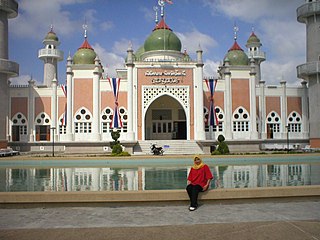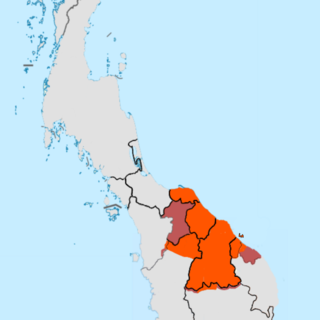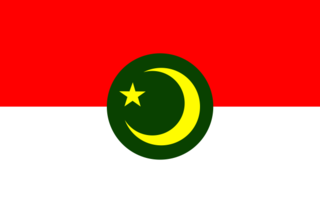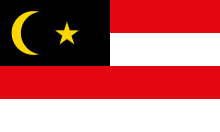
Pattani is one of the southern provinces of Thailand. Neighboring provinces are Narathiwat, Yala, and Songkhla. Its capital is the town of Pattani.

Narathiwat is one of the southern provinces (changwat) of Thailand. Neighboring provinces are Yala and Pattani. To the south it borders the Malaysian state of Kelantan and Perak. The southern railway line ends in this province, which is one of the nation's four provinces that border Malaysia. The province features a range of cultures as well as natural resources, and is relatively fertile. Narathiwat is about 1,140 kilometers south of Bangkok and has an area of 4,475 km2 (1,728 sq mi). Seventy-five percent of the area is jungle and mountains and has a tropical climate.

Yala is the southernmost Province (changwat) of Thailand. Neighboring provinces are Songkhla, Pattani, and Narathiwat. Yala is one of two landlocked provinces in southern Thailand, the other being Phatthalung. Its southern part borders Kedah and Perak of Malaysia.

PataniDarussalam is a historical region and sultanate in the Malay peninsula. It includes the southern Thai provinces of Pattani, Yala (Jala), Narathiwat (Menara), and parts of Songkhla (Singgora). Its capital was the town of Patani.

Kelantan-Pattani Malay is an Austronesian language of the Malayic subfamily spoken in the Malaysian state of Kelantan, as well as in Besut and Setiu districts of Terengganu state and the Perhentian Islands, and in the southernmost provinces of Thailand. It is the primary spoken language of Thai Malays, but is also used as a lingua franca by ethnic Southern Thais in rural areas, Muslim and non-Muslim and the Sam-Sam, a mostly Thai-speaking population of mixed Malay and Thai ancestry.

The South Thailand insurgency is an ongoing conflict centered in southern Thailand. It originated in 1948 as an ethnic and religious separatist insurgency in the historical Malay Patani Region, made up of the three southernmost provinces of Thailand and parts of a fourth, but has become more complex and increasingly violent since the early 2000s from drug cartels, oil smuggling networks, and sometimes pirate raids.
The 2005 Songkhla bombings were a series of three bombings that took place on 3 April 2005 in the cities of Hat Yai and Songkhla of Thailand's Songkhla Province. They and are believed to be part of the ongoing south Thailand insurgency. At least two people were killed and 66 were injured in the explosions.
The Islamic Liberation Front of Patani, until 1986 known as the National Liberation Front of Patani is a militant Islamic separatist movement based in northern Malaysia and with a history of operations in the South Thailand insurgency.

The Barisan Revolusi Nasional Melayu Patani, also known by the shorter form Barisan Revolusi Nasional ), meaning "National Revolutionary Front", is an Islamist Patani independence movement in northern Malaysia and Patani, southern Thailand. As of 2017, it is the most powerful rebel group in the region.
Gerakan, meaning movement in Malay, can refer to:

Bersatu, also referred to as the Patani Malays People's Consultative Council was an umbrella group of separatist organisations of the predominantly Muslim and Malay provinces of Southern Thailand ("Patani").

Thai Malays, with officially recognised terms including 'Malayu-descended Thais' and 'Malay', is a term used to refer to ethnic Malay citizens of Thailand, the sixth largest ethnic group in Thailand. Thailand is home to the third largest ethnic Malay population after Malaysia and Indonesia and most Malays are concentrated in the Southern provinces of Narathiwat, Pattani, Yala, Songkhla, and Satun. Phuket Ranong, and Trang home to a sizeable Muslim population, also have many people who are of Malay descent. A sizeable community also exists in Thailand's capital Bangkok, having descended from migrants or deportees who were relocated from the South from the 13th century onwards.

The 2012 Southern Thailand bombings were a series of bombings that took place in Yala, Yala Province and in Hat Yai, Songkhla Province, on 31 March 2012.
The Kumpulan Mujahidin Malaysia (KMM), or Malaysian Mujahideen Movement, is/was a terrorist organisation that supported an overthrow of the Mahathir government and is/was for the creation of a pan-regional Islamic state comprising southern Thailand, the entirety of Indonesia, and the southern Philippines. It is believed to be self-financing and is often tied in correlation to smaller more extremist groups in Southeast Asia. The KMM is often cited as being associated with the Jemaah Islamiyah or JI. The Malaysian government, which is actively fighting against the Malaysian Mujahideen Movement, has arrested anywhere from 70 to 80 terrorists. The government currently has 48 members in total detained.
The Pattani Islamic Mujahideen Movement is an Islamic insurgent movement that has carried out violent actions as part of the protracted insurgency in Southern Thailand.
The Runda Kumpulan Kecil is a militant Islamic insurgent group operating in Southern Thailand.
This article lists a chronology of events in the South Thailand insurgency from the 1960s. Most take place in the Muslim-majority, contested provinces of Narathiwat, Pattani, and Yala in the far south of Thailand bordering Muslim Malaysia.

Haji Sulong Abdulkadir al-Fatani, also known as Haji Sulong Tomina or Hajji Sulong, was a reformist and a separatist who disappeared in 1954. He sought greater recognition of the Jawi community in Patani. His motives for doing so were in response to General Phibun's concept of 'Thainess' in which every citizen has to subscribe to the ideology that it is the duty of a Thai to be Buddhist, speak Thai and love the monarchy. This nationalist ideology was prejudiced against other ethnic groups in Thailand like the Jawi community and deemed the Tai ethnic groups more superior than others. Haji Sulong's request for reforms in education and public administration in southern Thailand was deemed disruptive and viewed as an act of rebellion by the central Buddhist state based in Bangkok. Tensions between the central Buddhist state and the Muslim insurgents remain in the present and Haji Sulong's demands still stand firm and synonymous with the various insurgent groups in southern Thailand.

The Kingdom of Reman or Kingdom of Rahman was a landlocked semi-independent Malay kingdom established in northern Malay Peninsula.

The 15th Infantry Division (พล.ร.๑๕.) is an infantry division of the Royal Thai Army, it is currently a part of the Fourth Army Area. The unit is composed of the 151st Infantry Regiment, 152nd Infantry Regiment and 153rd Infantry Regiment and Service Support Regiment. The division engaged in the South Thailand insurgency.

















